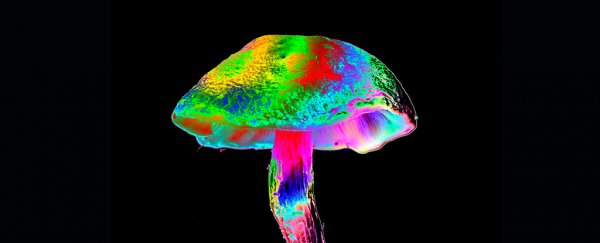New research has revealed an intriguing link between psilocybin – the psychedelic substance in magic mushrooms – and opioid addiction: people who have used psilocybin at some point in their lives are significantly less likely to become addicted to opioids.
This discovery raises the possibility of using psilocybin as a way of tackling opioid use disorder. With nearly 70,000 opioid-related deaths recorded in the US in 2017, and a million more expected in the next decade, it's now a major health issue.
According to survey data on 214,505 individuals collected between 2015 and 2019, opioid use disorder was 30 percent less likely in those who had used psilocybin compared to those who had never used it, suggesting a protective effect might be there.
What's more, the study showed that those who had used psilocybin were 17–34 percent less likely on average to have experienced 7 of the 11 symptoms of opioid abuse and dependence (including being unable to set limits on opioid use, having resulting problems at home, work or school, and being put in physical danger due to opioid use).
"Our findings suggest it is worth investigating the protective effects of psilocybin for all related diagnostic criteria for opioid use disorder, including overuse and tolerance, opioid-related emotional distress, and opioid-related social and work problems," write the researchers in their published paper.
The 30 percent reduction is close to one observed in a previous study. This time around, the researchers wanted to try and replicate the results with more recent data, across a larger sample, and with more psychedelics taken into consideration.
No such link was found between peyote, mescaline, or LSD and opioid addiction; it appears that there's something about the active compound of magic mushrooms in particular that helps with opioid abuse.
For now though, this is just an association: the data aren't robust enough to prove definitively that it's the psilocybin that's reducing the risk of getting addicted to opioids, only that there appears to be some kind of connection there. Clinical trials will be required to confirm a casual relationship.
"Psilocybin was the sole classic psychedelic substance associated with lowered odds of past year opioid use disorder in a large, nationally-representative sample of the US population," write the researchers.
"These findings accord with other population-based survey research indicating that classic psychedelics share differing relationships to mental health outcomes in naturalistic contexts."
As yet, it's not clear what the potential explanation might be, but scientists have some hypotheses. For example, psilocybin might interfere with the transmission of serotonin and dopamine, neurotransmitters that are connected to addiction in the brain.
Alternatively, it might be the spiritual experiences that some people get when using psilocybin that's then reducing the risk of opioid addiction – these types of mystical experiences have been shown to help people recovering from addiction.
Opioids, which can include heroin and fentanyl, as well as prescription opioid compounds, are now responsible for 70 percent of all overdose deaths in the US. Currently, the best forms of treatment involve synthetic opiate derivatives – so people are simply swapping one dependence for another.
Ultimately, that's the purpose of the study – to see if psilocybin stands up as a potential treatment for opioid addiction (the psychedelic has already shown promise as a way of weaning people off alcohol and nicotine).
"There is a clear need to identify more effective interventions for opioid use disorder as well as to explore protective factors that may increase the likelihood of abstinence from these addictive compounds," write the researchers.
The research has been published in Scientific Reports.
